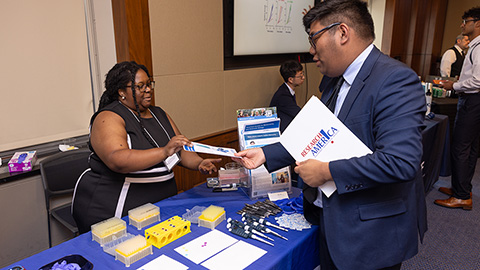FIRM Act would require some foreign scientists to register as foreign agents
In late January, U.S. Rep. Seth Moulton, D-Mass., introduced the Foreign Influence Registration Modernization Act, or the FIRM Act, to the U.S. House of Representatives. This bill would require people in pursuit of academic or scholarly work who represent foreign governments that engage in human rights abuses to register as foreign agents. If enacted, this legislation would affect some foreign scientists collaborating with U.S. scientists on federally funded research.
With this bill, Moulton seeks to amend the Foreign Agents Registration Act of 1938, called FARA for short. That act was originally intended, as Moulton put it in an article in Time magazine, to “counter the rise of fascism in America as foreign operatives were spreading disinformation and propaganda.” FARA requires individuals who represent the interests of foreign powers in a political capacity or quasi political capacity to disclose their relationships with the foreign governments and register as foreign agents.
Moulton’s bill, meanwhile, is intended to modernize the disclosure requirements for foreign agents by digitizing the process; it also would narrow the definition of a foreign agent to an individual representing a foreign government, instead of “foreign powers.” In doing so, this act changes the exemption for scientists; under FARA, individuals in scholarly or scientific pursuit representing a foreign government do not have to register as foreign agents. But under the FIRM Act, any scientist representing a foreign government or receiving financial contributions directly from a foreign government that has committed human rights abuses would have to register as a foreign agent.
This would include any scientists who participate in foreign talent-recruitment programs, such as China’s Ten Thousand Program, which has been at the center of violations of research integrity. Moulton has insisted that “China has an all-out government effort to infiltrate our national security and education institutions.”
In recent years, several foreign researchers have failed to disclose funding they receive from China or have violated the confidentiality of peer review at the National Institutes of Health. The NIH has investigated at least 180 scientists at more than 65 institutions since 2018 for “violating policies requiring grantees to report their foreign ties.”
The NIH has been working closely with the FBI to conduct these investigations and has referred several cases of alleged foreign influence in federally funded research to the FBI.
The FBI also has urged universities to review research conducted by Chinese scientists that could have defense applications. Since 2018, federal investigators have visited 10 institutions with a list of Chinese research institutions and/or companies for the university to monitor for research violations. The FBI also has been offering briefings to universities about foreign influences on scientific research conducted in the U.S.
The FIRM Act has been referred to the House judiciary committee. A month after the bill was introduced, U.S. Rep. Banks, R-Ind., co-sponsored the bill, indicating that the bill is gaining some traction. The judiciary committee will decide to whether to revise the bill or recommend a vote by the full House.
The ASBMB will continue track and report on the progress of this bill and other developments regarding foreign influence in U.S. scientific research.
Enjoy reading ASBMB Today?
Become a member to receive the print edition four times a year and the digital edition monthly.
Learn moreGet the latest from ASBMB Today
Enter your email address, and we’ll send you a weekly email with recent articles, interviews and more.
Latest in Policy
Policy highlights or most popular articles

Embrace your neurodivergence and flourish in college
This guide offers practical advice on setting yourself up for success — learn how to leverage campus resources, work with professors and embrace your strengths.

ASBMB honors Lawrence Tabak with public service award
He will deliver prerecorded remarks at the 2025 ASBMB Annual Meeting in Chicago.

Summer internships in an unpredictable funding environment
With the National Institutes of Health and other institutions canceling summer programs, many students are left scrambling for alternatives. If your program has been canceled or delayed, consider applying for other opportunities or taking a course.

Black excellence in biotech: Shaping the future of an industry
This Black History Month, we highlight the impact of DEI initiatives, trailblazing scientists and industry leaders working to create a more inclusive and scientific community. Discover how you can be part of the movement.

ASBMB releases statement on sustaining U.S. scientific leadership
The society encourages the executive and legislative branches of the U.S. government to continue their support of the nation’s leadership in science.

ASBMB and advocacy: What we accomplished in 2024
PAAC members met with policymakers to advocate for basic scientific research, connected some fellow members with funding opportunities and trained others to advocate for science.

